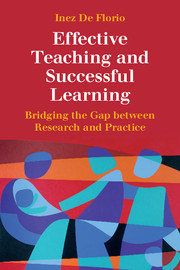Book contents
- Frontmatter
- Epigraph
- Contents
- Preface
- Introduction
- 1 Main Features of Scientific Research on Education
- 2 Important Types of Scientific Research on Education
- 3 Main Features of Evidence-based Research on Education
- 4 Meta-Analyses on Education
- 5 A Synthesis of Over 800 Meta-Analyses Relating to Achievement
- 6 Scaffolding Effective Teaching and Successful Learning
- 7 Planning and Starting the Lesson
- 8 Presenting Knowledge and Skills – Assertive Questioning
- 9 Guided and Independent Practice
- 10 Cooperative and Project-based Learning
- 11 Feedback – Reciprocal and Informative
- Concluding Remarks: Standards Need More Evidence
- References
- Index
10 - Cooperative and Project-based Learning
Published online by Cambridge University Press: 05 June 2016
- Frontmatter
- Epigraph
- Contents
- Preface
- Introduction
- 1 Main Features of Scientific Research on Education
- 2 Important Types of Scientific Research on Education
- 3 Main Features of Evidence-based Research on Education
- 4 Meta-Analyses on Education
- 5 A Synthesis of Over 800 Meta-Analyses Relating to Achievement
- 6 Scaffolding Effective Teaching and Successful Learning
- 7 Planning and Starting the Lesson
- 8 Presenting Knowledge and Skills – Assertive Questioning
- 9 Guided and Independent Practice
- 10 Cooperative and Project-based Learning
- 11 Feedback – Reciprocal and Informative
- Concluding Remarks: Standards Need More Evidence
- References
- Index
Summary
With step 30, the transition or conclusion of the first learning cycle, the new concepts are related to other concepts and schemata already stored in the brain. In the flow of the lesson, the students have gone through important learning phases: they have been informed about the goals, the learning intentions and the success criteria; the teacher has presented, modeled, or demonstrated the new learning content in interactive dialogue furthered by assertive questioning; the students have deepened their learning processes through guided and independent practice, interacting with the teacher and their peers. Last but not least, misconceptions or lack of understanding have been objects of learning loops.
COOPERATIVE VS. COLLABORATIVE LEARNING
The end of the first cycle has to be followed by further activities in order to create automaticity. Educationalists and experienced teachers know that knowledge, skills, and attitudes have to be overlearned at least four times during the days and weeks after the end of the first learning cycle. As previously mentioned, massed practice is much less effective than spaced forms distributed over time. This deliberate practice is characterized by variation of context and situations, multiple experiences, and continuous feedback (see Chapter 11). Overlearning in the sense of deliberate practice differs from the previous forms of practice.
Deliberate practice is different from just practice. Deliberate practice involves concentration and someone monitoring and providing feedback during the practice. Furthermore, the activity being practiced is usually a challenge for the student and it helps if the student is aware of the goal of the practice and has a clear idea of what success looks like. A major role of schools is to teach students to value deliberate practice and learn that this type of practice leads to competence. (Anonymous, 2013, p. 7; author's emphases)
Quite often teachers use cooperative or collaborative learning to further deliberate practice. Scientists as well as practitioners differentiate between cooperative and collaborative learning even though many characteristics of both strategies of small-group learning are alike. Cooperative learning is a team approach that aims simultaneously at academic and social skills. The success of the group depends on every member being accountable for the positive outcome of the group as a whole. Social learning is an explicit objective of cooperative learning. In order to help students to deepen basic knowledge, skills, and attitudes, this form of team learning is widely structured by the teacher.
- Type
- Chapter
- Information
- Effective Teaching and Successful LearningBridging the Gap between Research and Practice, pp. 175 - 197Publisher: Cambridge University PressPrint publication year: 2016
- 1
- Cited by



